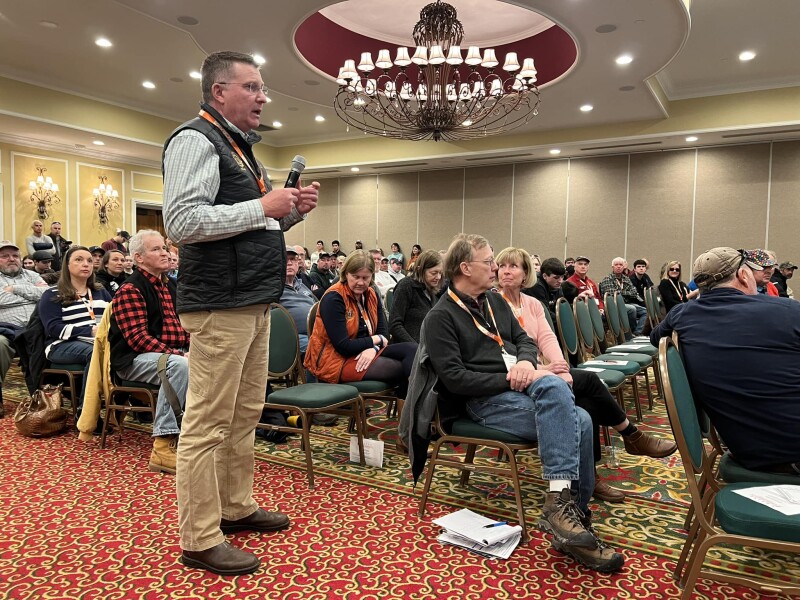Maine's lobster industry is at a crossroads, grappling with proposed size limit changes that have stirred passionate debates among fishermen and regulators alike.
Last night’s Department of Marine Resources (DMR) meeting in Augusta served as the epicenter of this controversy, focusing on a proposal to raise the minimum size limit for lobsters. This seemingly minor adjustment of 1/16 of an inch has ignited fierce opposition from the lobstering community, who fear the economic repercussions could be devastating; some fishermen had proven the increase to be significant by testing out the measure for themselves before it was to go into effect on July 1, 2025.
The proposal aimed to address a reported 35 percent decline in the lobster population within the state's primary fishing area, Lobster Management Area 1 (LMA 1), as highlighted by data from the Atlantic States Marine Fisheries Commission (ASMFC). However, many fishermen have questioned the accuracy of this data, challenging its validity. The tension reached a boiling point during the meeting when DMR Commissioner Patrick Keliher faced accusations of capitulating to federal regulators and Canada. In a rare moment of frustration, Keliher responded with an “F-you” to a lobsterman in the audience. An incident he later apologized for, citing his deep commitment to the industry and the pressures of the moment.
"I remain dedicated to working in support of this industry and will continue to strengthen the relationships and build the trust necessary to address the difficult and complex tasks that lay ahead," Keliher said in a statement following the meeting.
The All Things Lobstering Facebook page became a hub for community reactions. One post reflected long-standing frustration with the regulatory process: "I’ve always thought the commissioner position should be a panel of 5 that are involved in the fisheries. It’s too much power for one person calling the shots for everyone."
Another post celebrated the withdrawal of the proposal: "Measure increase was thrown out today at the meeting, this is a huge turning point for this fishery. This shows that numbers and our voice together CAN make change. We need to band together and voice how we feel. Together we can make this industry OURS again."
A follow-up comment on the same thread highlighted lingering worries: "I do love the hold on everything, but is anyone else worried about or did they even pay attention to what Keliher said ‘the ramifications will be worse if they don’t get what they want for results’… maybe I’m the only one that heard it that way but just something to think about."
Congressman Jared Golden, a staunch advocate for Maine's lobster industry, praised the decision to withdraw the proposal. "I have always said that Maine’s lobstermen are the best, most informed conservationists for this precious and storied fishery," Golden remarked. His support was instrumental in the decision, as he has consistently voiced concerns about the economic and scientific implications of the proposed changes.
Golden’s statement was met with gratitude from industry leaders. Virginia Olsen, director of the Maine Lobstering Union, expressed the community's relief: "Our members are very happy that the lobster gauge increase has been shelved, and grateful to Congressman Golden for his unwavering support for Maine lobstermen."
Dustin Delano, chief operating officer of the New England Fishermen’s Stewardship Association (NEFSA), echoed these sentiments, emphasizing the importance of standing up against regulations that could harm the industry. “NEFSA is grateful to Commissioner Keliher for pulling down the proposed rule in the State of Maine, and we hope New Hampshire and Massachusetts will follow suit. We have fought hard to bring the overwhelming opposition of the lobster fishery to every table from the State of Maine to ASMFC,” stated Delano. “NEFSA is confident that the possibility of non-compliance was a risk worth taking to avoid many lobstermen and processors going out of business. NEFSA will continue to be involved in this situation of uncharted waters as the pieces fall into place and advocate for New England lobstermen every step of the way.”
The background of the controversy lies in the ASMFC's data indicating a significant decline in lobster stocks, which triggered the need for new conservation measures. However, Maine fishermen have persistently questioned the reliability of this data, especially given the competitive disadvantage they face compared to Canadian harvesters who operate under different regulations.
Jeff Nichols, communications director for the Maine DMR, explained the potential consequences of non-compliance with ASMFC regulations, "If the state were not to implement this regulation, it’s possible that the state could be found out of compliance with that fishery management plan. That could ultimately result in the closure of the fishery." Warning about the high stakes involved in the regulatory decisions.
"The decision by the DMR not to implement a minimum gauge increase in the Maine lobster fishery is a direct result of lobstermen speaking up and making their voices heard. The Maine Lobstermen’s Association (MLA) has long been opposed to a gauge increase due to concern over the economic impacts on the industry and has called on regulators to provide more time to collect more accurate data on lobster populations," Patrice McCarron, COO of the MLA stated. "The MLA appreciates DMR’s willingness to listen to the industry’s concerns and to work with us and other industry advocates on a reasonable path forward that will not only protect the resource but also safeguard lobstermen against the financial harm we believe would have been caused."
Looking ahead, the community is bracing for further discussions and potential regulatory changes. The DMR has scheduled another public hearing in early February, with a final vote on the proposed rule still pending. Meanwhile, the fishing community is rallying together, as evidenced by the strong turnout at the recent meeting, both in person and via Zoom.
One Facebook post captured the community's resolve: "We had 100 in-person lobstermen and 100 Zoom attendees, but I know plenty more who could’ve been there. Even if it’s just sitting in a chair, it matters. Together we can make this industry OURS again." This collective spirit will be crucial as Maine’s lobster industry navigates the challenges ahead.
The path forward for Maine's lobster industry remains uncertain, but what is clear is the determination of its community to have their voices heard and to play an active role in shaping the future of this vital fishery. With upcoming public hearings and ongoing debates on regulations, the industry’s resilience and unity will be pivotal in ensuring its sustainability.
This is a developing story. Check back for updates.







